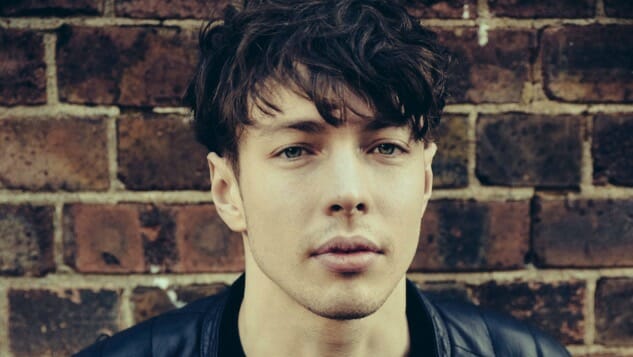Barns Courtney: The Best of What’s Next

There’s confidence. And then there’s the swaggering self-assurance displayed by raspy-throated British blues rocker Barns Courtney on his recent single “Fire,” a swampy, Gospel-steeped stomper with reflective verses like “My mother told me son let it be / Sold my soul to the calling / Sold my soul to that sweet melody / Now I’m gone, now I’m gone, now I’m gone” and a chorus so gargantuan it actually caught the ear of Harvey Weinstein; the Miramax mogul thought it would fit nicely onto the soundtrack for Burnt, a film he was producing with Bradley Cooper about a chef on the comeback trail, and Cooper—after one listen to the rollicking track—agreed wholeheartedly. But there was a time not so long ago when the singer was shivering like a cornered chihuahua, unclear on his sound, his songwriting abilities, and whether he had a future in contemporary music at all.
Courtney’s tale is strange and serpentine. Sort of a rags-to-riches, then-right-back-to-Top-Ramen-rags-again tale. Fresh out of high school, he had been signed to Island Records, but after three years under sketchy contract, even sketchier management—and having composed roughly five albums’ worth of material—his more alternative-leaning debut disc had yet to be released. Then his deal fell through, the label held on to the masters and he wound up couch surfing at friends’ houses, occasionally sleeping in his girlfriend’s car and punching the 9-5 clock at a London computer software store. “And I was amazing at it, I’ll have you know, for the first week,” he chuckles, having maintained a disarmingly droll wit throughout the ordeal. “I was all starry-eyed and excited to start my new job. And then it slowly dawned on me that I might never make music, ever again.”
To add insult to injury, the kid was working directly across the street from the swank hotel where he was once wined and dined by competing record company executives who promised him the world. “So I’d look up every day at this enormous monolith to all of my past failings, eat my little sandwich and listen to my old manager’s new band on the radio. And I’d just think, ‘My God.’ There’s nothing wrong with having an honest job, but it was such a shock to go from one extreme—where I was following my dream and doing nothing but music every day—to the other, where I seemed to have no prospects whatsoever.”
Courtney’s worst moment ever? The night he slept in his gal’s automobile—since she wasn’t allowed guests at her flat when her landlord was on the prowl—and her mother yanked his blanket off of him at dawn and told him to take a hike since said landlord was coming. “It was really bad, because I had to work at the computer store that day, so I had to wander the streets for three hours before I could go to work,” he recalls. “So I went and sat in that hotel that I used to stay in and just waited there. Where I used to wait to meet those labels. But worse things have happened to other people, I’m sure. I don’t want to make my whole life sound like a sob story.”
-

-

-

-

-

-

-

-

-

-

-

-

-

-

-

-

-

-

-

-

-

-

-

-

-

-

-

-

-

-

-

-

-

-

-

-

-

-

-

-








































